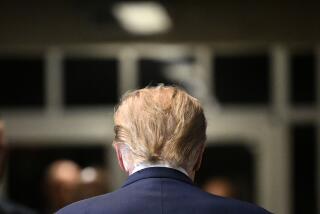The U.S. Must Make Sure the Trials Are Fair
- Share via
In these times of grave danger, some see civil courts as too uncertain of outcome and too slow in determining critical cases involving vital national security. Such cases can take eight to 10 years for final adjudication while providing a continuing forum--at government expense--for propagation of terrorist views.
Military commissions, meanwhile, are perceived as unreliable, second-rate tribunals that are subject to criticism as instruments of a victor’s revenge or as vehicles that allow a rush to judgment. Their quality has been spotty.
Both systems--civil and military--need some redesign to make them effective and persuasive in our current situation. In this redesign, each of the three branches of government has a role to play.
First, the judiciary. One step it can take immediately is to assign major terrorist prosecutions in civil courts to those judges best equipped by skill, temperament and experience to handle critical, high-profile cases.
These judges must be able to move trials expeditiously while maintaining control over the proceedings, which may involve combative counsel.
An example of good assignment was the Oklahoma bombing case, which caused 168 deaths.
The jury trial of the first defendant was completed in 2those months and that of the second defendant before the same judge in two months. U.S. District Judge Richard P. Matsch achieved these results through good organization, extensive advance preparation for trial and prompt rulings. His performance contrasts sharply with comparable prosecutions before other judges.
Assignment or advance designation of specific judges to handle major terrorist prosecutions could be made either nationally by the chief justice or regionally by the chief judge of each circuit.
Next, Congress can modify the antiquated requirement that a jury verdict in a criminal case be unanimous, a requirement dating back to the 14th century. England and the U.S. states of Oregon and Louisiana have adopted 10-2 verdicts for criminal cases, and the U.S. Supreme Court has upheld the constitutionality of such verdicts.
Unanimity of verdict serves no purpose that cannot equally be served by super-majority verdicts that, experience shows, produce fewer hung juries, resulting in both more acquittals and more convictions.
Finally, in the executive branch, the president can raise the quality of military commissions by improving the caliber of his appointments to these tribunals and by revising their procedures. These appointments, unless delegated, are his personal responsibility.
Every trial is an exercise in persuasion and must be seen by the public as fair. Although reports last week on the Bush administration’s draft rules for military tribunals may indicate that such concerns are being taken into account, a major weakness of military commissions lies in the quality of the people designated to serve on them.
All too often a military commission has been made up of colonels between assignments and/or officers who will not be greatly missed from their regular duties. Many of those appointed have little familiarity with the law, which allows the commission’s procedures to be largely orchestrated by the adjutant general prosecutor.
If trials of terrorists by military commissions are to carry the perception of fairness, then the tribunal in major prosecutions should consist primarily of civilians possessing the highest credentials.
For high-profile cases, the president must use the persuasiveness of his office to recruit distinguished judges, lawyers, legislators and legal scholars to serve on such commissions.
The president also must require transparency of proceedings, limiting military secrecy to the essentials.
These changes will narrow differences in quality and procedure between civil and military proceedings, to the betterment of both. The choice of forum then can be made more on geographic and policy considerations and less on calculation of outcome.
*
Macklin Fleming, a retired justice of the California Court of Appeal, is the author of the “Perfect Justice” (University of New Haven Press, 2001).
More to Read
Sign up for Essential California
The most important California stories and recommendations in your inbox every morning.
You may occasionally receive promotional content from the Los Angeles Times.










